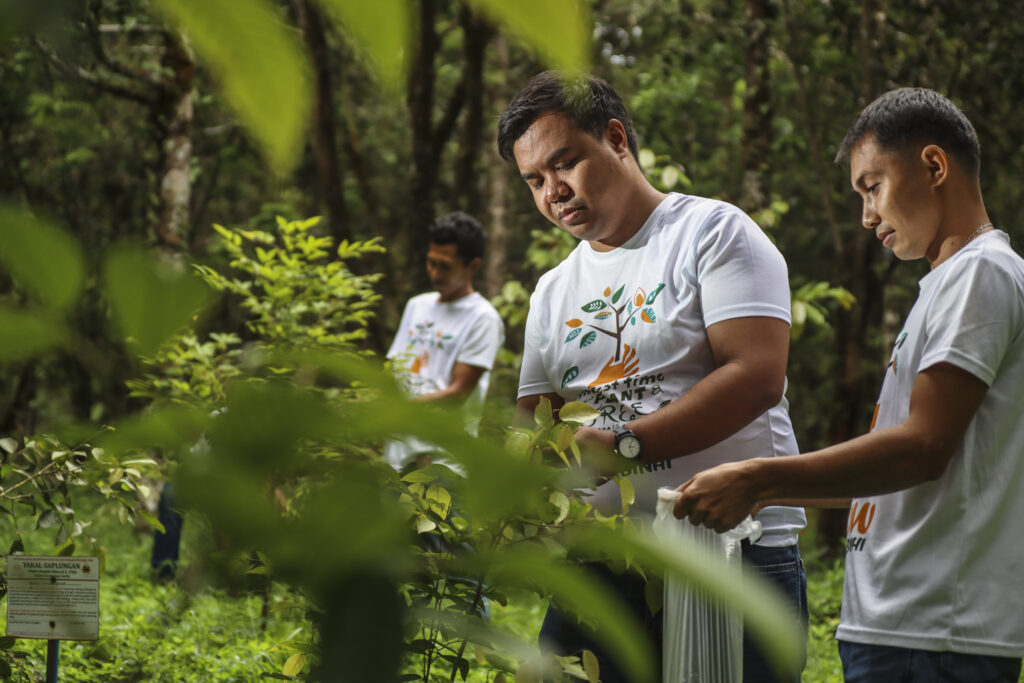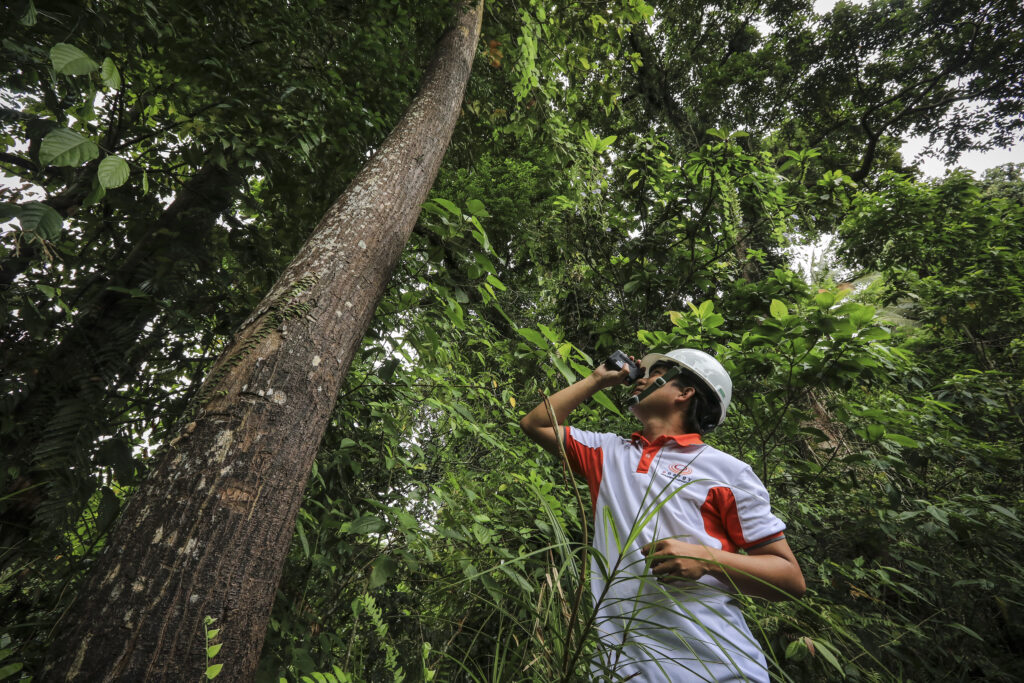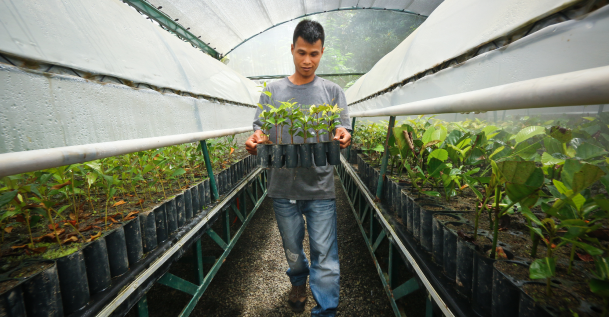In line with EDC’s revitalized mission of forging collaborative pathways for a regenerative and decarbonized future, EDC BINHI continues to be a catalyst for strategic partnerships on environmental conservation. Despite the pandemic, EDC BINHI remained steadfast in its multi-awarded initiative to rescue, protect, and propagate Philippine native tree species, many of which are categorized as critically-endangered or on the brink of extinction.

Ex-Situ Conservation involves partnering with like-minded organizations to establish arboreta and tree parks dedicated to housing threatened native trees while nurturing them into mother trees that will produce viable seeds in the coming years. The arboreta and tree parks are strategically located in areas for people to visit and understand the importance of forests and biodiversity.
As of December 2023, EDC BINHI partners have established 37 arboreta and 163 tree parks nationwide that serve as safe havens for threatened native species.

In-Situ Conservation focuses on conserving the threatened Philippine native tree species in their natural habitats. This involves partnering with local government units to improve the local environmental policies, raising awareness of communities on the tree species of interest, and building the capacity of stakeholders to implement appropriate local conservation actions to conserve the habitat of Philippine native trees.
EDC BINHI continues to work toward propagating the 145 priority native tree species. By investing in research and development, we have formulated new propagation protocols for various threatened tree species. The propagation protocols will guide the proliferation of the species and help ensure that these will not be extinct given the right propagation technology.
As of to date, EDC developed propagation protocols for 34 threatened tree species and continues to conduct research and development to ensure continuous survival of the threatened species.
EDC BINHI maintains four vegetative material reproduction (VMR) facilities that are crucial to the propagation of tree species. The VMR is a state-of-the-art nursery equipped with automated mist irrigation systems that mimic natural forest habitat conditions and increase seedlings’ survival rates.
The VMR is also designed to assist with the vegetative or asexual reproduction of the Philippine threatened tree species. This is critical to EDC’s thrust of mainstreaming native trees as it addresses the non-availability of planting materials or the rarity of tree species due to their threatened status.


EDC BINHI is the sole Philippine partner of Botanic Gardens Conservation International (BGCI) for the Global Tree Assessment (GTA), an initiative to conduct research and compile extinction risk information on all tree species worldwide and a testament to the international recognition of EDC as a contributor to the conservation of trees through the BINHI Program.
On March 22, 2021, EDC BINHI signed a partnership Memorandum of Agreement (MOA) with the BGCI to expand their collaboration in assessing the conservation status of more native tree species in the Philippines. Since 2019, EDC BINHI, through the BGCI-funded GTA, has undertaken assessments for 800 Philippine endemic tree species. These assessments were completed in December 2020 and published on the International Union for Conservation of Nature (IUCN) Red List website.
The MOA extends the partnership between EDC BINHI and BGCI for an additional two years. It also expanded the scope of the collaboration to include 200 Philippine endemic species and 470 species classified as near-endemic tree species.
In line with EDC’s revitalized mission of forging collaborative pathways for a regenerative and decarbonized future, EDC BINHI continues to be a catalyst for strategic partnerships on environmental conservation. Despite the pandemic, EDC BINHI remained steadfast in its multi-awarded initiative to rescue, protect, and propagate Philippine native tree species, many of which are categorized as critically-endangered or on the brink of extinction.

Ex-Situ Conservation involves partnering with like-minded organizations to establish arboreta and tree parks dedicated to housing threatened native trees while nurturing them into mother trees that will produce viable seeds in the coming years. The arboreta and tree parks are strategically located in areas for people to visit and understand the importance of forests and biodiversity.
As of December 2022, EDC BINHI partners have established 32 arboreta and 163 tree parks nationwide that serve as safe havens for threatened native species.

In-Situ Conservation focuses on conserving the threatened Philippine native tree species in their natural habitats. This involves partnering with local government units to improve the local environmental policies, raising awareness of communities on the tree species of interest, and building the capacity of stakeholders to implement appropriate local conservation actions to conserve the habitat of Philippine native trees.
EDC BINHI continues to work toward propagating the 96 priority native tree species. By investing in research and development, we have formulated new propagation protocols for various threatened tree species. The propagation protocols will guide the proliferation of the species and help ensure that these will not be extinct given the right propagation technology.
As of to date, EDC developed propagation protocols for 34 threatened tree species and continues to conduct research and development to ensure continuous survival of the threatened species.
EDC BINHI maintains four vegetative material reproduction (VMR) facilities that are crucial to the propagation of tree species. The VMR is a state-of-the-art nursery equipped with automated mist irrigation systems that mimic natural forest habitat conditions and increase seedlings’ survival rates.
The VMR is also designed to assist with the vegetative or asexual reproduction of the Philippine threatened tree species. This is critical to EDC’s thrust of mainstreaming native trees as it addresses the non-availability of planting materials or the rarity of tree species due to their threatened status.

EDC BINHI is the sole Philippine partner of Botanic Gardens Conservation International (BGCI) for the Global Tree Assessment (GTA), an initiative to conduct research and compile extinction risk information on all tree species worldwide and a testament to the international recognition of EDC as a contributor to the conservation of trees through the BINHI Program.
On March 22, 2021, EDC BINHI signed a partnership Memorandum of Agreement (MOA) with the BGCI to expand their collaboration in assessing the conservation status of more native tree species in the Philippines. Since 2019, EDC BINHI, through the BGCI-funded GTA, has undertaken assessments for 800 Philippine endemic tree species. These assessments were completed in December 2020 and published on the International Union for Conservation of Nature (IUCN) Red List website.
The MOA extends the partnership between EDC BINHI and BGCI for an additional two years. It also expanded the scope of the collaboration to include 200 Philippine endemic species and 470 species classified as near-endemic tree species.
In line with EDC’s revitalized mission of forging collaborative pathways for a regenerative and decarbonized future, EDC BINHI continues to be a catalyst for strategic partnerships on environmental conservation. Despite the pandemic, EDC BINHI remained steadfast in its multi-awarded initiative to rescue, protect, and propagate Philippine native tree species, many of which are categorized as critically-endangered or on the brink of extinction.

Ex-Situ Conservation involves partnering with like-minded organizations to establish arboreta and tree parks dedicated to housing threatened native trees while nurturing them into mother trees that will produce viable seeds in the coming years. The arboreta and tree parks are strategically located in areas for people to visit and understand the importance of forests and biodiversity.
As of December 2023, EDC BINHI partners have established 37 arboreta and 163 tree parks nationwide that serve as safe havens for threatened native species.

In-Situ Conservation focuses on conserving the threatened Philippine native tree species in their natural habitats. This involves partnering with local government units to improve the local environmental policies, raising awareness of communities on the tree species of interest, and building the capacity of stakeholders to implement appropriate local conservation actions to conserve the habitat of Philippine native trees.
EDC BINHI continues to work toward propagating the 145 priority native tree species. By investing in research and development, we have formulated new propagation protocols for various threatened tree species. The propagation protocols will guide the proliferation of the species and help ensure that these will not be extinct given the right propagation technology.
As of to date, EDC developed propagation protocols for 34 threatened tree species and continues to conduct research and development to ensure continuous survival of the threatened species.
EDC BINHI maintains four vegetative material reproduction (VMR) facilities that are crucial to the propagation of tree species. The VMR is a state-of-the-art nursery equipped with automated mist irrigation systems that mimic natural forest habitat conditions and increase seedlings’ survival rates.
The VMR is also designed to assist with the vegetative or asexual reproduction of the Philippine threatened tree species. This is critical to EDC’s thrust of mainstreaming native trees as it addresses the non-availability of planting materials or the rarity of tree species due to their threatened status.

EDC BINHI is the sole Philippine partner of Botanic Gardens Conservation International (BGCI) for the Global Tree Assessment (GTA), an initiative to conduct research and compile extinction risk information on all tree species worldwide and a testament to the international recognition of EDC as a contributor to the conservation of trees through the BINHI Program.
On March 22, 2021, EDC BINHI signed a partnership Memorandum of Agreement (MOA) with the BGCI to expand their collaboration in assessing the conservation status of more native tree species in the Philippines. Since 2019, EDC BINHI, through the BGCI-funded GTA, has undertaken assessments for 800 Philippine endemic tree species. These assessments were completed in December 2020 and published on the International Union for Conservation of Nature (IUCN) Red List website.
The MOA extends the partnership between EDC BINHI and BGCI for an additional two years. It also expanded the scope of the collaboration to include 200 Philippine endemic species and 470 species classified as near-endemic tree species.
Copyright 2022 BINHI | Let The Future Take Root. All rights reserved.
© Copyright 2022 BINHI. All rights reserved.
© Copyright 2022 BINHI. All rights reserved.